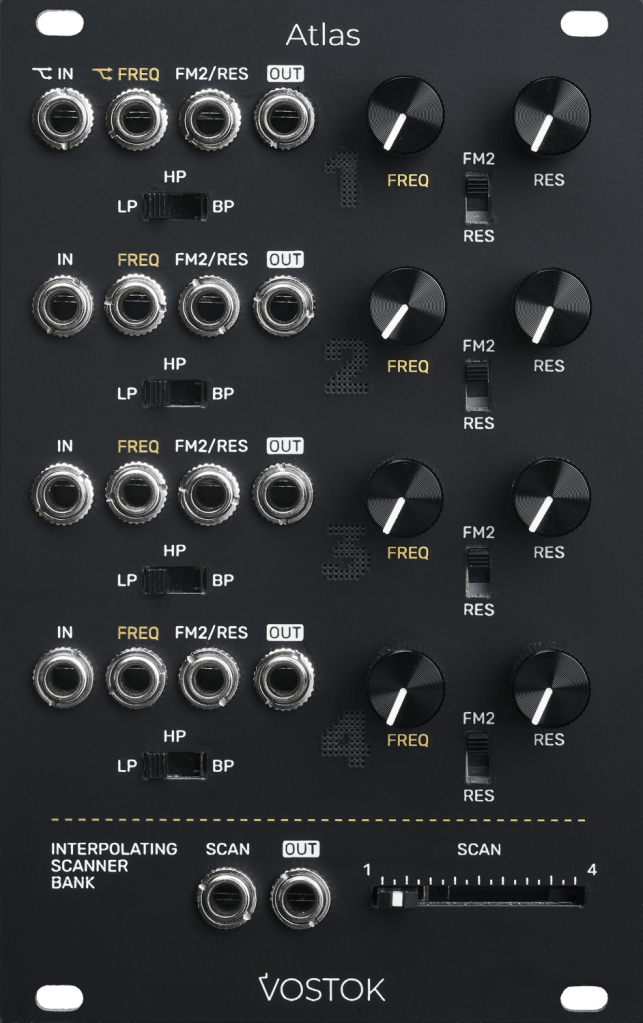80s Japanese synths like the SH-101, JUPITER, JUNO, and TR drum machines were defined by both their filters and the engineering around them. We’re fortunate to talk to Vostok Instruments about the design of their new four-channel Atlas filter module – what it learns from the 80s classics, and what it adds to the equation.
The Atlas Quad Core Multimode filter was in the deluge of new gear late last month, but it deserves some special mention. It’s no secret that in these CDM parts, we’re all enamored of the original Dave Rossum-designed SSM2164 chip and the modern redesign true to that original, the Sound Semiconductor SSI2164. That new SSI chip is now finding its way into a lot of gear for a reason. (And if you don’t know your IC parts, don’t worry – you’ll know the instruments that used them.)
The Atlas is an especially attractive design for bringing that chip into the modular world. You get four filters on Atlas:

The cores are a modern approach to the gain-cell-based filters included in many of the classic Japanese synths of the 80s, with a vastly improved dynamic range, a super-accurate resonance compensation circuit, and a clean self-oscillation. It is perfect for recreating iconic TR-drum sounds by pinging the filters with fast envelopes or triggers.
Just having four filters with CV control is cool, but the added sauce is the ability to morph between all filter outputs, creating some timbres and shapes you couldn’t get before. That’s via a dedicated Interpolating Scanning Circuit that handles the morphing, plus a nicely accessible scanning fader and CV control.
Features onboard Atlas:
- Four filters, each with lowpass, highpass, and bandpass modes
- Continuous resonance control
- CV control of filter cutoff
- CV control switchable between frequency (FM2) or resonance (set to frequency, the two frequency controls are summed)
- Scan CV input for controlling filter scanning (morphing)
- Dedicated fader for scanning through filters
And yes, with filter inputs on each, you can ping any (or all) of the filters with signals, ideal for percussive sounds.
The four filters are daisy-chained, too, by default – patch a cable on the input to break the chain. That opens up some nice parallel filtering options.
All of this is 280€ pre-tax; street price is less. Perfect Circuit has Atlas available now (on preorder):
If you buy something from a CDM link, we may earn a commission.
Atlas Quad-Core Multimode Filter
More on Atlas:
https://www.vostokinstruments.com/atlas
16HP, but you get a lot of action out of that 16HP. I talked to Vostok’s Jose Angel Cabrera more about the design work that went into this. Jose tells CDM:
The filter cores are designed around the SSI2164 IC by Sound Semiconductor, a modern redesign of the classic SSM2164 designed by Dave Rossum, which has an improved dynamic range and low distortion. That was key to me because I love the clean sound of this type of filter, but in several designs the dynamic range is limited to prevent the filter from distorting, flattening the sound of the filter, and losing character.
I worked a lot in Atlas cores to get a balance between a good amount of dynamic range and a very low distortion. The filters can sweep freely at high resonance levels. They can go loud if they need to. I didn’t limit the output levels so they can go beyond the standard +/-5V, but you hardly will hear it distort. That, summed with the compensated resonance circuit, gives a lot of character to the filter because the passband is always there. For most people, it is more noticeable in the low-pass mode because you don’t lose the bass, but it also makes the high-pass sound great as the sound retains its air and brightness.
The Interpolating Scanner is based on the original Jurgen Haible circuit and the later improved version by Donald Tillman. The goal of the circuit is to consecutively turn transistors ON and OFF with an external CV to create a current line that drives several VCAs.
I breadboarded those circuits years ago and found them very interesting to pair with filters but it was hard to find a good compromise between a smooth shape that allows middle middle-points between the channels and also retaining a homogeneous gain curve, so I decided to start from the scratch and make my version of the circuit. The Atlas scanner has a very smooth fading slope with an accurately matched behavior on the channel traveling, so it feels nice when you pass across different filter combinations. It also uses the same chip I use on my six-channel VCA module Ceres, the AS3360, a modern revision of the classic Curtis CEM3360. The 3360 is a nice-sounding VCA chip with clever and optimized linearization, which is critical in this design as we want to preserve the scanning shape intact.
I own an SH-101, my favorite synth of all time, and I worked with tons of the most iconic Roland synths of that era, like the SH-2, Jupiters, Junos, TRs, etc. I am very inspired by those schematics, and I learned a lot from them. The Atlas filters are a compendium of everything I like from those synths, with more modern techniques and components that have a positive impact, not only on the sound but also on other things like power consumption. Atlas power consumption is 170mA, but counting the number of VCAs and OPAmps the module uses, the low distortion configuration of the circuit, and the fact that it has four entirely dedicated multimode filters and a scanning bank, it is very efficient.
I am glad you liked the design! It is one of the most important things for me. I am a big fan of clean interfaces that help usability, which I try to expose in my modules. I am not planning to do a narrower version of Atlas, but I like the idea. While it is not a little module (16HP), I think it is very HP efficient because you get four filter blocks plus the scanning in 16HP, with the handy cascade input function that avoids the need for a multiple (or let the ones you already have free), and also reduces the number of patch cables needed for some patches.
Of course, space nerds will immediately note that this is a module from Vostok, the Soviet R-7-derived rocket that launched Sputnik and early Luna (and Yuri Gagarin), but with the model name Atlas, the USA’s iconic missile/rocket that launched Mercury missions (like John Glenn) and the Mariner probe.
DivKid did a launch video featuring the new module which works through a lot of its sound design possibilities – particularly that morphing scanner, which you really need to hear:
Stazma did some patching work with it too:
Perfect Circuit has Atlas available now (on preorder):
If you buy something from a CDM link, we may earn a commission.
Atlas Quad-Core Multimode Filter
And they carry the full Vostok range:
Vostok Instruments @ Perfect Circuit
And I can’t mention Atlas without watching the current-generation Atlas V launch the Perserverance rover to Mars from the Cape.
And the view from the rocket:




